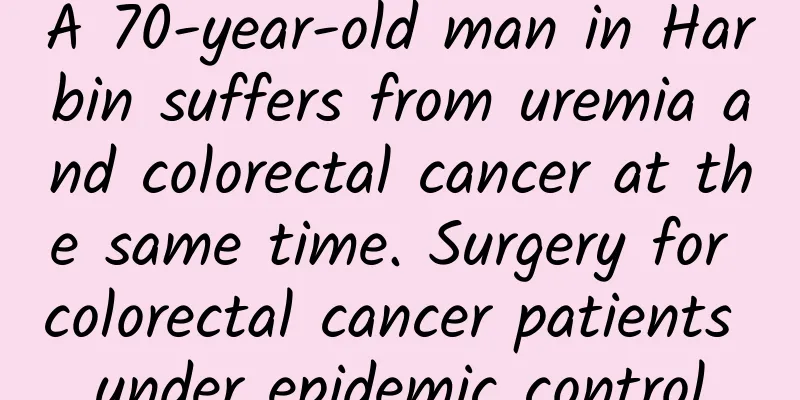A 70-year-old man in Harbin suffers from uremia and colorectal cancer at the same time. Surgery for colorectal cancer patients under epidemic control

|
Although the COVID-19 pandemic has recurred, it has not stopped medical staff from saving lives and healing the wounded. At the end of March this year, Professor Huang Rui, deputy director of the Colorectal Tumor Committee of the Heilongjiang Provincial Medical Promotion Association and the Department of Colorectal Tumor Surgery of the Second Affiliated Hospital of Harbin Medical University, and his team took the risk and actively created conditions under strict control in some areas of the city. They successfully performed "laparoscopic radical resection of sigmoid colon cancer and descending colostomy" for a 70-year-old man with uremia and colorectal cancer, thereby completely removing the lesion and eliminating the threat of intestinal obstruction. Due to full preoperative evaluation and judgment, careful operation during the operation, and rapid resumption of enteral nutrition after the operation, the elderly man had his abdominal drainage tube removed 6 days later and was discharged from the hospital 10 days later. Wu, a 70-year-old man from Suihua City, Heilongjiang Province, was diagnosed with uremia two years ago. He had to undergo heparinized dialysis for many years, which resulted in poor basic physical condition. To make matters worse, Wu began to have blood in his stool and difficulty defecating in the past month, and was diagnosed with colon cancer at a local hospital. If surgery is not performed early, there is a high possibility of intestinal obstruction. The elderly's children registered with Professor Huang Rui online, hoping that the Second Hospital of Harbin Medical University could lend a hand and allow the patient to be hospitalized for treatment as soon as possible. After learning about this, Professor Huang actively coordinated, and the head nurse of the department made special arrangements and quickly arranged a bed. On the premise that several nucleic acid tests were negative, the elderly was soon admitted to the colorectal tumor surgery ward. By asking about the patient's medical history, Professor Huang Rui and his team learned that Mr. Wu had severe uremia and needed to go to the hospital for dialysis three times a week. His coagulation function was getting worse and worse. He also had a history of hypertension and cerebral hemorrhage, accompanied by right-sided hemiplegia. After the old man was admitted to the hospital, Professor Huang asked the nephrologist to perform hemodialysis for him regularly, and asked the relevant departments to quickly conduct a series of examinations. The blood picture report showed that the patient's hemoglobin was 76 g/L and creatinine was 818 mol/L... These indicators indicated that Mr. Wu had anemia, hypoproteinemia, and acid-base imbalance, and his intestinal tumor grew rapidly, seriously affecting the old man's diet and digestive function, causing him to be very weak. After a multidisciplinary preoperative consultation and discussion in the hospital, experts unanimously agreed that although the surgical risk of uremia combined with rectal cancer is extremely high, it is completely possible to reduce postoperative complications and mortality by preoperative cardiopulmonary function training, strengthening perioperative enteral and extra-enteric nutritional support, choosing a reasonable surgical procedure, ensuring the high quality of the operation, and taking strong anti-infection measures and adequate hemodialysis. With careful preparation, on March 30, Huang Rui's team performed "laparoscopic sigmoid colon cancer radical resection and descending colostomy" for Wu. During the operation, the tumor was found to be located in the sigmoid colon, with a size of 5×4×4 cm, and had not metastasized to the abdominal liver, peritoneum, omentum and other tissues and organs. The postoperative pathology was "sigmoid colon ulcer type moderately differentiated adenocarcinoma", and the lymph nodes were not affected. According to experts, uremia is the terminal stage of chronic kidney disease. At this stage, due to the low immune function of patients, it is very easy to induce various cancers, especially digestive tract tumors. When uremia and intestinal cancer are "linked" together, it will lead to a series of pathological and physiological changes such as diabetes, anemia, hypoproteinemia, acid-base imbalance, water and electrolyte disorders, and hypertension. On the one hand, severe sodium retention can increase the cardiovascular load; on the other hand, the uremia toxins cannot be excreted from the body, which can lead to various surgical complications, and undoubtedly become a high-risk group for surgical operations. In an interview with media reporters after the operation, Professor Huang Rui pointed out: In the face of the difficult disease of uremia combined with rectal cancer, there are always more solutions than difficulties! Nowadays, such patients are no longer absolute contraindications for surgery! Through the practical experience of this operation, Huang Rui's team summarized the following experiences: First, relevant examinations need to be completed before the operation, the patient's condition should be accurately assessed, and concomitant diseases such as hypertension and diabetes should be actively controlled; at the same time, the dialysis schedule should be scientifically arranged, and the operation should be completed within 24 hours after a certain dialysis. Second, during the operation, step by step, the tumor should be removed carefully, and collateral damage should be avoided as much as possible. At the same time, accurate hemostasis, reduced bleeding, and controlled the amount of fluid intake during the operation should be achieved to prevent heart failure and pulmonary edema. Third, strict postoperative management is required, regular dialysis is resumed, various indicators of renal function are closely observed, the total amount of fluid input is regulated, and the transition to enteral nutrition is rapid. Fourth, the principle of full-process management should be implemented. During the preoperative, intraoperative, and postoperative medical treatment, drugs with low nephrotoxicity should be selected, the amount of fluid should be minimized, and blood tests should be reviewed regularly to closely monitor changes in renal function. Fifth, the medical team needs to fully assess various potential risks based on the patient's health status and develop active and prudent medical plans, especially safe and effective perioperative diagnosis and treatment plans, to facilitate the patient's smooth recovery and the opportunity for long-term survival. Huang Rui pointed out that there are few case reports on colorectal cancer associated with uremia, and there is still a lack of clear standards and guidelines for the treatment of these difficult diseases. We need to overcome difficulties and continue to accumulate knowledge in the future to form an industry consensus as soon as possible. |
<<: Natural childbirth has many benefits
Recommend
There is a fatal weakness in a woman's body
People have control over their own immune systems...
Can cervical tumor grade 3 be cured?
Some patients with cervical cancer did not go to ...
Lose 10 pounds in a week after menstruation
During the menstrual period, the body's metab...
Is TPPA positive and RPR negative contagious?
Common diseases include bacterial infection of th...
Why does feeding grandma give me a headache?
Breastfeeding should begin as soon as the baby is...
How to do push-ups for women
We all know that push-ups are a convenient and ef...
Enzyme fasting weight loss method
I believe many people are surrounded by weight pr...
What are some tips for breast enhancement in Lifestyle?
Breast augmentation is the process of turning a w...
Going to the toilet after drinking water means your kidneys are not good? Can eating black food nourish your kidneys? The truth is...
The kidneys are the body's "purifiers&qu...
Female genital structure picture
The function of the female vagina is to be the re...
What are the health-preserving soups for women?
Many women in life know that women age faster aft...
How to differentiate benign from malignant pelvic masses?
If you want to determine whether the pelvic mass ...
What causes coccyx pain in pregnant women?
As we all know, various functions of a woman'...
Menstrual flow is light for more than ten days but still does not stop
Some girls feel anxious when their period lasts l...
Fasting blood sugar level of 5.9 is considered normal? Reminder: Diabetes may be just around the corner
Blood sugar is one of the important indicators fo...









